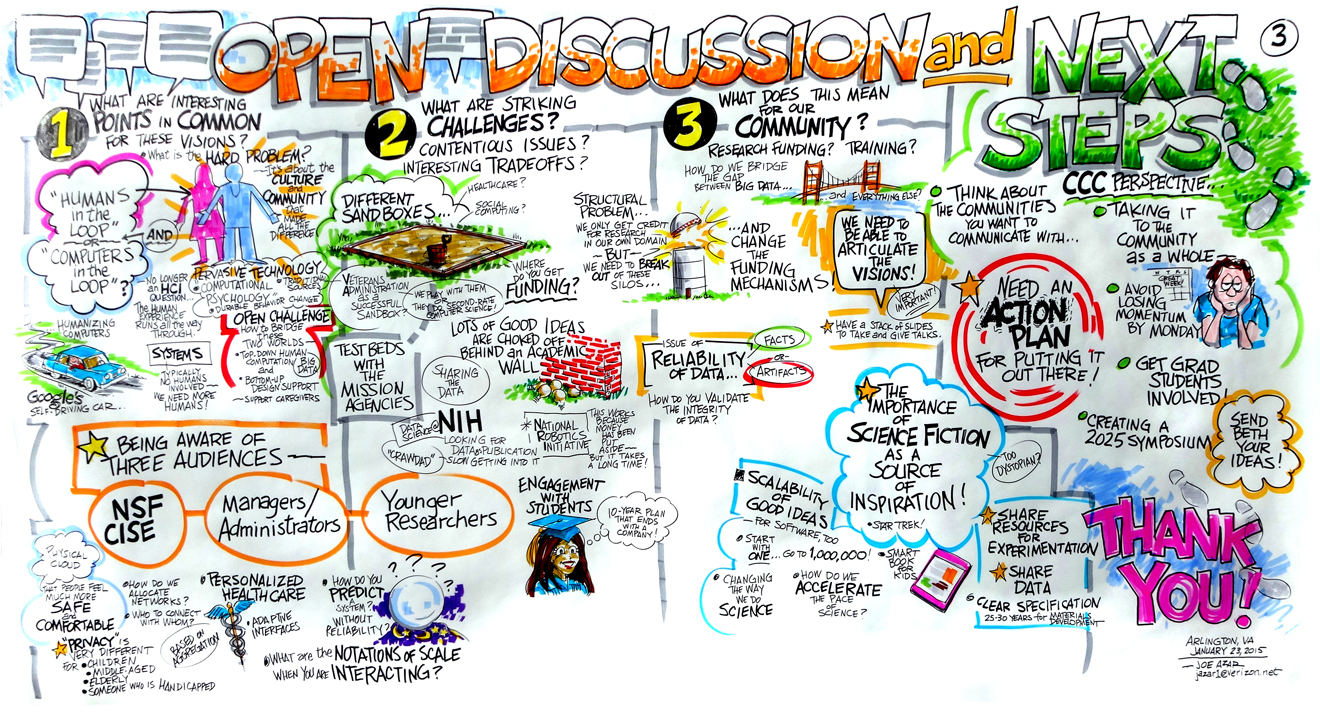Computing Research News
February 2015 Vol. 27/No. 2
Computing Visions 2025
By Beth Mynatt, CCC Vice Chair
The Computing Visions 2025 initiative is intended to inspire the computing community to envision future trends and opportunities in computing research. It started in November 2012 when the Assistant Director for the National Science Foundation (NSF) Directorate for Computer & Information Science & Engineering (CISE) at the time, Farnam Jahanian, engaged the CISE Advisory Council (AC) in a brainstorming event about CISE 10-15 years out.
The questions were:
Where is the computing field going over the next 10-15 years?
What are potential opportunities, disruptive trends, and blind spots?
Are there new questions and directions that deserve greater attention by the research community and new investments in computing research?
To answer these questions, the CISE AC Visions 2025 working group did some initial brainstorming and decided that they needed to continue this process with the broader community. A steering committee was formed with members of the CISE AC and the Computing Community Consortium (CCC) to create a set of workshops that catalyze cross-computing and cross-disciplinary discussions.
The first workshop, Interacting with the Computers All Around Us, was held in May 2014. It was followed closely by the second workshop, The New Making Renaissance: Programmable Matter and Things, in June 2014. The outcomes of these two workshops were discussed in a panel discussion at the Snowbird Conference in July, 2014.
The final Computing Visions 2025 event was a roundtable that was held January 23rd, 2015 in Arlington, Virginia. Twenty-five participants from academia and industry discussed research themes that emerged from the first two 2025 workshops and pulled insights from a number of relevant CCC workshops (Extensible Distributed Systems, Aging in Place, BRAIN, Uncertainty in Computing).
These themes included the growing importance of integrating information about people and the physical world “up and down the stack” in many facets of computing research. The field should look to innovations in material science, AI and machine learning, and manufacturing as well as embrace the pervasiveness of computing in industry and society. Many hard problems remain, such as the difficulty in recognizing meaningful human activity and scaling computing systems across many dimensions.
Implications for the field also included the importance of interdisciplinary work, curating and publicizing data, the need for testbeds that reflect that changing face of computing systems, and the need for deeper collaborations across many industrial sectors. Contributions by computing researchers across scientific fields must be recognized in order for computing research to flourish alongside the pervasive importance of computing in industry and society.
The two workshops and roundtable will be summarized in a Visions 2025 report that will inform agencies and the computing community on the direction of the next generation. It will be distributed broadly with the community.

At the Visions 2025 Roundtable, a graphic recorder listened to the discussions and sketched imagery to help the group visualize ideas.
1828 L STREET, NW SUITE 800, WASHINGTON, DC 20036 | P: 202-234-2111 | F: 202-667-1066




